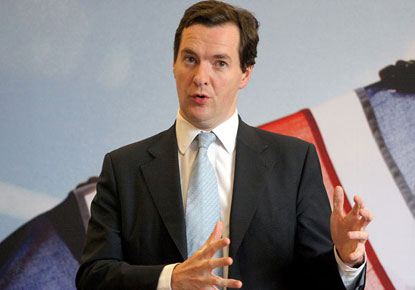By Richard Johnstone | 16 December 2014
The coalition has reduced the period over which the government must forecast a balanced budget from five years to three, meaning an extra £30bn of spending cuts or tax rises will be needed to close the current deficit.

The revised Charter for Budget Responsibility, which is to be voted on by MPs in the New Year, commits the Treasury to balancing the cyclically adjusted current budget over a three-year period at every Budget. This means, for example, that at Budget 2015 Chancellor George Osborne will need to show that forecast spending will be balanced by 2017/18.
This rule will replace the one put in place by Osborne in his first fiscal charter in 2010, which called for balance to be achieved by the end of a rolling five-year forecast.
In his emergency budget in June 2010, this committed Osborne to balancing the budget by 2015/16. Although this commitment will not be met, the rolling five-year target still currently applies.
Announcing the new mandate, the Treasury said the lower three-year period reflected the progress made in cutting the deficit so far, which allowed the period to be shortened.
As part of the charter, a new supplementary target has also been set to get public sector debt falling as a percentage of gross domestic product by 2016/17. This will replace the existing supplementary target that debt should be falling as a percentage by 2015/16, which the government has not been on track to meet since the 2012 Autumn Statement.
According to a Treasury analysis, meeting these two new targets will require around £30bn of total spending cuts or tax rises in 2016/17 and 2017/18.
Setting out the charter, Osborne said it would entrench the government’s commitment to maintaining economic stability. He has set a Conservative party pledge to run a total public spending surplus by the end of the next parliament, with recent projections expecting the government spending to be in the black in 2018/19.
‘Thanks to our long-term economic plan, we will have halved the deficit by the end of this parliament. I have always been clear that more tough choices will need to be made in the next parliament to eliminate the deficit and get debt falling.’
Chief Secretary to the Treasury Danny Alexander said the UK had entered the financial crisis and recession with the largest structural deficit of any major economy.
‘Thanks to the difficult decisions that we’ve taken, we have taken a giant leap towards eliminating our structural deficit and setting debt on a declining path. By updating the charter today, we set out what it means to finish that job, which is crucial for creating a stronger economy, and fairer society.’
Shadow chancellor Ed Balls said Labour had also pledged to get the current budget into surplus.
‘In the Budget, George Osborne talked about a vote on balancing the overall budget. Today he and David Cameron have done a staggering U-turn on this vote and are now proposing a vote on the current budget, excluding capital investment. This is the same measure of the deficit the Labour Party has been committed to targeting for the last three years.
‘We said in January that we want to get the current budget into surplus and national debt falling as soon as possible in the next Parliament. This charter is consistent with our position so we’ll vote for it.’




















